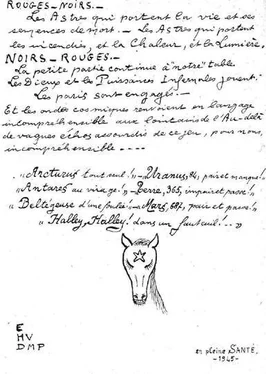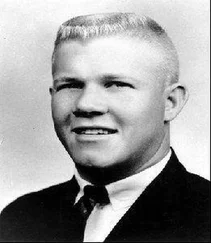At ten o’clock that morning, the German-controlled broadcasting organization Radio Paris first announced the gruesome discovery of the charnel house on rue Le Sueur. “Petiot has fled Paris,” the presenter said, not wasting any time to speculate on the suspect’s whereabouts. “He will likely return to the terrorist bands of Haute-Savoie ,” as officials dubbed the Resistance fighters in the Alpine region bordering Switzerland, “and resume his position as médecin-major.” In this initial broadcast, as well as many others that followed that day, the radio station painted a portrait of the killer as an outlaw terrorist who opposed the Third Reich.
But Radio Paris had a poor reputation as a source of information. “Radio Paris lies, Radio Paris lies, Radio Paris is German” was a popular refrain sung to the tune of “La Cucaracha.” Was Petiot really with the Resistance? Rumors inside the police force already circulated of the suspect’s ties to clandestine patriotic organizations. Massu had also heard that a leader of a Resistance network had arrived at the crime scene, spoken with police officers, and then, after having been shown inside the building, left with their permission. Patrolmen Fillion and Teyssier still denied this allegation, but Massu planned to question the patrol officers himself.
As news of the discovered human remains spread, many people began to take detours to see the building on rue Le Sueur, a short walk from the Arc de Triomphe, the Avenue des Champs-Élysées, and the Bois de Boulogne. Many women with handbaskets stopped by on the way to and from the daily ritual of standing in long lines at the bakery, the dairy, the butcher, the greengrocer, the tobacconist, and elsewhere, where they hoped to obtain expensive, often poor-quality rationed goods, if they were still available. When one of Petiot’s neighbors, Madame Legouvé, went for a walk with her daughter that morning, she heard two people speak of the discovery. One gasped at the stench outside the physician’s town house, claiming that “it smells like death,” and the other replied that “death has no odor.”
Inside Legouvé’s rue Le Sueur apartment building, discussion was more animated. One of her neighbors noted that the smell on the sidewalk was of no consequence compared to the courtyard: “There, it is truly, truly foul.” Another neighbor, Monsieur Mentier, shrugged his shoulders, unwilling to speculate other than to state that the smell might well be explained by a crack in the main line of the sewer. The concierge hinted at something more sinister: “If I told you everything I know, it is likely that you would change your opinion.”
2.
THE PEOPLE’S DOCTOR
ALL THINGS TRULY WICKED START FROM AN INNOCENCE.
—Ernest Hemingway, A Moveable Feast
DR. Marcel André Henri Félix Petiot had seemed a respectable family physician with a flourishing medical practice. He adored his wife, Georgette Lablais Petiot, an attractive thirty-nine-year-old brunette whom he had married almost seventeen years before. They played bridge, often went to the theater or the cinema, and doted on their only son, Gérard (Gerhardt Georges Claude Félix), one month from his sixteenth birthday. All of this made the discoveries at rue Le Sueur even more inconceivable.
The physician had grown up in Auxerre, an old medieval town just under one hundred miles southeast of Paris. At its center, amid the half-timbered buildings on the winding cobbled streets, stood the imposing Gothic Cathedral of St. Étienne and the large Benedictine Abbey of Saint-Germain, with its late-fifteenth-century clock tower. The Yonne River runs through this wine-growing district famous for its Chablis, branching out into the surrounding wooded region that produces its second-leading export, timber.
Petiot’s father, Félix Iréné Mustiole, worked at the Auxerre postal and telegraph office. His mother, Marthe Marie Constance Joséphine Bourdon, or Clémence as she preferred to call herself, had also worked there, as a young postal clerk before his birth. Petiot, the older of two children, was born January 17, 1897, just over ten years before his brother Maurice was born in December 1906. Petiot had lived his earliest years in the family’s rented apartment on the top floor of a house at 100 rue de Paris.
In 1912, his mother died from complications of a surgery. “At the death of my sister,” Henriette Bourdon Gaston told the police in March 1944, “I raised my nephews.” Many villagers, on the other hand, would claim that the brothers had lived with her much longer, Marcel for extended periods of time since the age of two. Was Gaston ashamed of the man he had become and therefore downplaying her involvement in his upbringing?
It was difficult, for Massu and historians alike, to navigate through the layers of rumor, gossip, and myth that surrounded Petiot’s childhood. As with many other accused murderers, former neighbors dwelled upon tales of his sadism and antisocial behavior. Young Petiot, it was said, liked to capture insects and pull off their legs and heads. He snatched baby birds from nests, poked out their eyes, and laughed as they shrieked in pain and stumbled into the side of the cage. Then, withholding food, he watched them starve to death.
Even his favorite cat was not immune to his cruelty. In one of several variants of the story, when Henriette Gaston was preparing to wash clothes, she put a tub of water on the stove and went to fetch the linen. Marcel was playing on the kitchen floor with the cat. When Gaston returned, the young boy was holding the animal by the neck and attempting to dip its paws in the scalding water. She screamed. Marcel, changing abruptly, hugged the cat to his chest and yelled back that he hated her and wished she were dead. The next morning, after she tried to teach him a lesson in empathy by allowing him to sleep with the cat, she awoke to find the boy covered with scratches and bites. The cat had been smothered to death.
A plethora of anecdotes was easily obtained in the gossip that circulated about the physician, but they were often difficult to verify. By most accounts, Petiot was precocious and highly intelligent. He read at an advanced level all his early years, and later, it was said, he devoured a book a night. His reading was said to be wide-ranging, though this was not reflected in his library, which had a disproportionate number of police novels, studies in criminology, and books about murderers, such as Henri Landru, Jack the Ripper, and Dr. Crippen.
As a child, Petiot had been easily bored in the classroom and often got into trouble. The French police would later learn that he was disciplined for bringing pornographic materials into his elementary school. As several of his former classmates would inform inspectors, young Petiot liked to read about the sexual habits of famous people, dwelling upon what was often then regarded as aberrational behavior. He spoke with relish about the homosexuality of Julius Caesar and Alexander the Great, or the bisexuality of Giacomo Casanova. One of his personal favorites was the Chevalier d’Eon, the transvestite fencer and spy who dazzled eighteenth-century French aristocratic circles.
The Petiot patriarch wanted his boys to follow him into the postal service. But Marcel was not interested in, as he put it, wasting away in an office waiting for old age. He wanted something greater.
Petiot had been an ambitious boy who yearned for power, wealth, and fame, and yet, ultimately, he proved to be a loner. Few friends from childhood would be uncovered. One friend was known only for allowing Petiot to stab a knife between his outstretched fingers on a table or throw them at him, like a circus performer. A former lover was found, a cabaret dancer named Denise, whom he met in his teens in Dijon. She left him one day, prompting Petiot later to quip that that was the only disappearance the police or press did not blame on him.
Читать дальше












